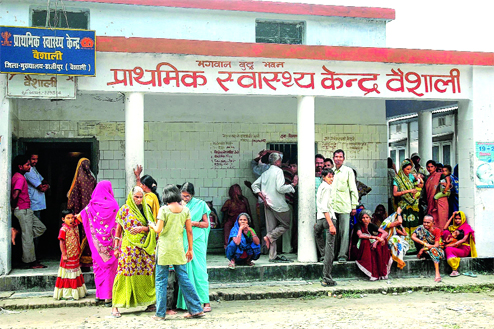
Thousands of pregnant women across Bihar do not receive iron and folic acid (IFA) tablets prescribed to all expectant mothers because of medicine stock-out in government hospitals, a study by US researchers has revealed.
The study by researchers at Emory University, which surveyed over 46,000 pregnant women across 1,500 villages in northern Bihar, found that 80 per cent of government clinics did not have IFA tablets though an estimated 60 per cent of women in the state are anaemic.
"These findings are alarming and state as well central governments should take a re-look at the efficacy of their antenatal programmes," said Amanda Wendt, the chief researcher.
Public health experts say anaemia during pregnancy can lead to several adverse birth outcomes, including low birth weight babies, pre-term delivery, stillbirths, and maternal and neonatal mortality.
"Over half of the anaemia cases are estimated to be due to iron deficiency," Wendt, who is also a visiting faculty at Heidelberg University, Germany, told The Telegraph. "Fortunately, an efficacious and cost-effective strategy exists for iron deficiency anaemia prevention and control."
The study, published in an international medical journal in March, has shown that antenatal care quality played key role in making IFA available to women and the consumption of IFA, independent of the timing of the first antenatal care visit.
"We also found that antenatal care quality was better among women with fewer visits than among women with four or more visits," she said.
The study noted that in Bihar, according to the country's last National Family Health Survey, 29.7 per cent received IFA and only 9.7 per cent of women consumed it for 90 or more days during pregnancy.
A similar survey by Unicef in 2009 had reported that only 6.7 per cent of women in the state consumed 100 or more IFA tablets during pregnancy, while 67.3 per cent had consumed none at all. The study stresses on a need for a steady IFA supply and higher quality antenatal care visits.
Consistent IFA supply, multiple contacts with healthcare workers and increased services provided are key facility level improvements that should increase IFA receipt and consumption for pregnant women in Bihar, the survey notes.
An expert at the Public Health Foundation of India, Delhi, who has worked in Bihar for several years, said: "It is estimated that about 20 to 40 per cent of maternal deaths in India are due to anaemia and Bihar is among the biggest contributors to all maternal deaths linked to anaemia."
"Despite the fact that anaemia has been identified as a global public health problem for several years, no rapid progress has been observed and the prevalence of the disease still high in the state," she said.
Senior officials in the Union health ministry, too, admit that the prevalence of anaemia among women of reproductive age has increased significantly during a recent seven-year period in India in general and Bihar, in particular.
"This increase is apparent across socio-economic groups," said a government source. "There is a geographical variation in anaemia trends, with a significant increase seen in 14 of the 25 states, including Bihar, and significant decrease in four states."










